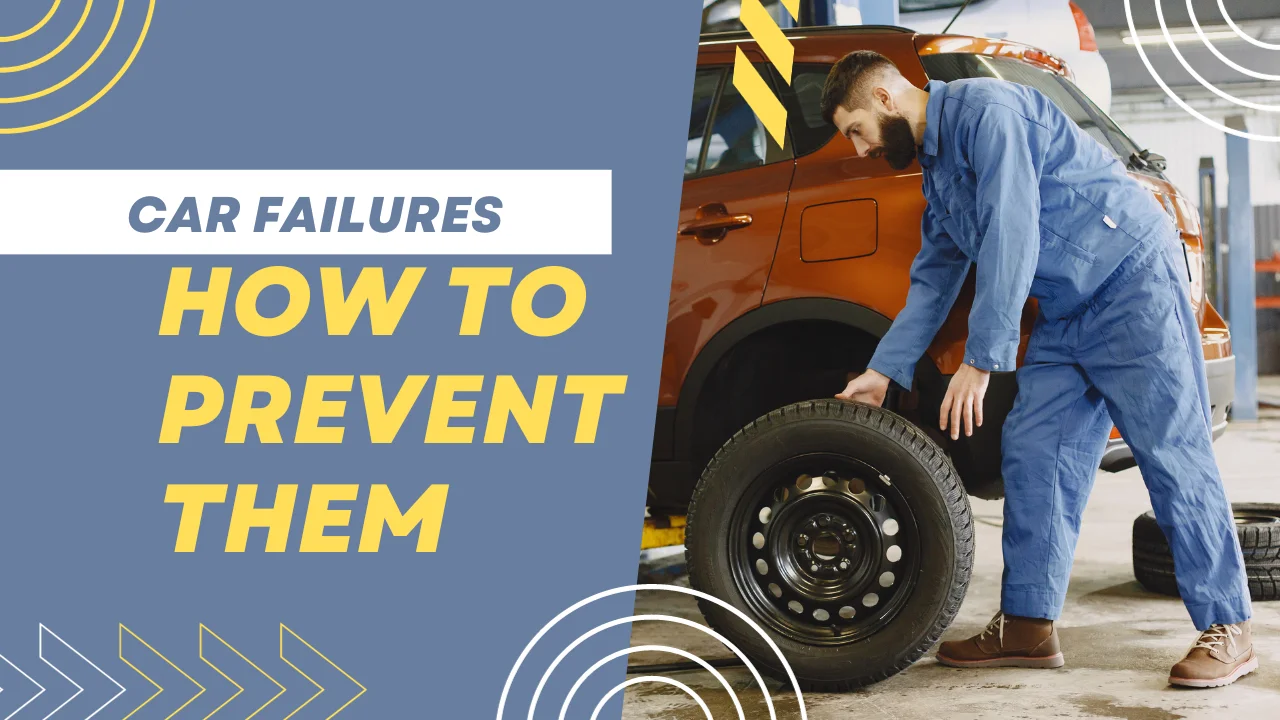Top 10 Common Car Failures and How to Prevent Them
Owning a car provides a sense of freedom and convenience, but it also comes with responsibilities. One of the most critical aspects of car ownership is understanding and preventing common car failures. From flat tires to engine overheating, these issues can be not only frustrating but also costly.
In this blog post, we will explore the top 10 common car failures and provide valuable tips on how to prevent them, helping you keep your vehicle running smoothly and avoiding unexpected breakdowns.
Flat tires
Flat tires are a common occurrence that can leave you stranded on the side of the road. To prevent this inconvenience: Regularly check your tire pressure using a tire pressure gauge. Ensure that it matches the recommended levels in your owner’s manual. Additionally, inspect your tire tread for signs of wear and replace tires when they become too worn. Avoid driving over sharp objects, and be cautious of potholes and curbs.
Dead battery
A dead battery can be a frustrating start to your day. To prevent this issue: Check your battery terminals for corrosion and clean them if necessary. Replace your battery every 3-5 years, or as recommended by the manufacturer. Be diligent about turning off lights, entertainment systems, and other accessories when the engine is not running.
Engine overheating
Engine overheating can lead to severe damage if not addressed promptly. To prevent this potentially costly issue: Regularly maintain your cooling system by checking the radiator, hoses, and coolant levels. Look for signs of leaks and address them immediately. Avoid running the engine when it’s too hot, and if you notice the temperature gauge rising, pull over safely and turn off the engine.
Brake failure
Brake failure can have catastrophic consequences. To prevent this safety hazard: Regularly inspect your brake pads and rotors for wear. Replace them as needed and follow the manufacturer’s recommended maintenance schedule for brake fluid changes. Keep an eye out for any unusual noises or changes in braking performance.
Check engine light
The dreaded check engine light can be a sign of various issues. To prevent unexpected visits to the mechanic: Stay on top of regular maintenance and inspections. Address any issues as soon as the check engine light comes on, as ignoring it could lead to more significant and costly problems down the road.
Fuel system problems
Issues with the fuel system can affect your car’s performance and fuel efficiency. To prevent fuel-related problems: Use high-quality fuel and fuel additives when necessary. Replace the fuel filter as recommended in your owner’s manual. To prevent condensation in the fuel tank, especially in cold weather, keep your gas tank at least a quarter full.
Transmission issues
Transmission problems can be expensive to repair. To prevent them: Follow the manufacturer’s recommended maintenance schedule for transmission fluid changes. Avoid excessive towing or overloading your vehicle, as this can strain the transmission.
Starter motor failure
A failing starter motor can leave you stuck with a car that won’t start. To prevent this frustrating situation: Ensure your battery is in good condition, as a weak battery can strain the starter motor. If your car doesn’t crank when you turn the key, avoid repeatedly attempting to start it, as this can damage the starter motor. Have it inspected if you notice any issues.
Electrical system failures
Electrical system failures can lead to various problems, from malfunctioning lights to a non-starting car. To prevent these issues: Check and replace fuses as needed. Keep electrical connections clean and free of corrosion. Regularly inspect your wiring for damage and replace any compromised sections.
Ignition system problems
Issues with the ignition system can disrupt your car’s performance. To prevent these problems: Replace spark plugs and ignition wires according to the manufacturer’s recommendations. Keep the ignition system clean and dry. Avoid over-revving the engine, as this can put stress on the ignition components.
Conclusion
As a responsible car owner, staying ahead of potential problems is key to saving yourself time, money, and the headache of an unexpected breakdown. That’s why it’s important to understand the top common car failures and take proactive steps to prevent them. Regular maintenance, attentive driving habits, and prompt attention to warning signs can make all the difference in keeping your vehicle running smoothly.
However, even with the best preventative measures, accidents can still happen. In the unfortunate event of an auto accident, it’s crucial to have a reliable auto accident lawyer in Magna on your side to help you navigate the complex legal process and get the compensation you deserve. So, stay proactive, stay safe, and protect yourself and your vehicle both on and off the road.






